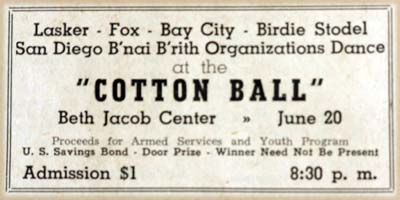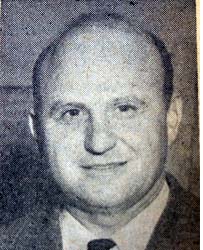|
B’nai B’rith Cotton Ball
To Be Event of Year
Southwestern Jewish Press June 12, 1953 Page 1
“The time is drawing near for the big dance of the year. Saturday night, June 20th is the date to remember for the B’nai B’rith “Cotton Ball” at the Beth Jacob Center, 4473 30th St. Casual cottons for men and women is the right thing to wear for comfort and a good time. The committee on decorations has some grand surprises for us. The tickets are going fine, and we know there will be a wonderful crowd.”
Anyone who buys tickets and cannot go, can turn their tickets in to the committee to be sent to the U.S.O. or send them direct to the U.S.O. Advisory Council 521 B St. So buy a ticket when come for a whopping good time, or let a serviceman use it, and you are approached and either turn in your stubs for the drawing of the door prize.
All proceeds from this dance will stay right here in San Diego to further B’nai B’rith work with the Armed Forces and the Youth Programs. The two B’nai B’rith lodges and the two chapters wish to thank the following for donating their advertising space in the Press for our ad in this issue: Harry Wax (who donated his space three times), Wm. Schwartz, Dave Stotsky, Nate Raitzas, Irving Friedman, Hy Kobernick, Si Rich, Henry Siner, and Louis Solomon.

Douglas Heads Fund’s
Allocation Committee
Southwestern Jewish Press June 12, 1953 Page 1
With a minimum of $210,000 in sight for the United Jewish Appeal, Murray D. Goodrich, president of the Fund today announced the appointment of the 1953 Allocations committee.
 Morris Douglas {at left}, outstanding civic and religious leader of the Jewish Community, will chair the committee which will be responsible for recommending to the Fund Board of Directors the distributions of the monies realized from the 1953 campaign. Morris Douglas {at left}, outstanding civic and religious leader of the Jewish Community, will chair the committee which will be responsible for recommending to the Fund Board of Directors the distributions of the monies realized from the 1953 campaign.
He will be joined, according to the By-laws of the Fund, by ten members of the Fund board of Directors and 15 members of the community at large which will constitute this important committee.
Board members invited to serve on the committee as announced at the Board meeting held last Tuesday are: Isaac Domnitz, Dr. Joshua A. Rittoff, William Schwartz, Morey Levenson, Jack Gross, Rubin Umansky, Mack Esterson, Mrs. Gabriel Berg, Milton Roberts, Louis Moorsteen, and past presidents of the Fund.
The Allocations Committee will study the needs and requirements of the 42 agencies which are beneficiaries of the United Jewish Fund in order to distribute equitably the funds raised. It is recognized that because of the limited amount of funds the community will not be able to support adequately these agencies whose needs far surpass the amount of money raised.
Go to top of right column
|
|
The Year Nobody Gave {Editorial}
Southwestern Jewish Press June 12, 1953 Page 2
That was the year nobody gave. People suddenly seemed to get tired of it all. It was like a disease, an epidemic. It swept the community.
Well, it didn’t take long after that. With nobody giving, the reserves that some agencies had were soon used up.
Most of the agencies didn’t have any reserves. They tried to borrow money from the banks, but with nobody willing to give as they had in the past, the banks were unwilling to lend.
So, one by one, the agencies closed down. The fund raisers and the social workers went to look for other jobs.
The people settled back. “At last,” they said to each other, “we’re free. We’ve ended this annual descent upon us. Now we can do what we please with our money. No more philanthropy. No more fund-raising meetings. No more emergency telegrams. No more stuffed mail boxes. No more pleas for help.”
And so the troubled children, the sick, the old, the helpless were left to shift for themselves.
No one worried about them, the next generation, about culture, Jewish education, family life.
No one was bothered by Israel, and Jews in other lands.
The millennium had come.
And yet, something was wrong. Because nobody gave, nobody did anything for anyone else.
Children still went to school but afterwards they had no place to go. Most of them played in the streets, trying the tempers of car drivers and their mothers.
The adolescents discovered the street corner hangouts, the pool hall, the lure of easy money.
As for the old people, it seemed nobody care about them at all. They died quietly in their lonely rooms and were buried without any fuss.
Nobody gave and nobody lived any better, ate any better, or did any better because of it.
Nobody gave but that didn’t end the needs.
Peiople still got sick and old. Children still got born—at home but not in the hospital. Minds became troubled. Families broke up.
Nobody gave and few knew what to do about all the trouble that still remained, except for some old campaign workers who began to refer to the good old UJA days.
Then it seemed that everybody got the idea at once.
“Let’s get together,” they said. “Let’s have a meeting. Let’s see what we can do. Let each of us give as much as we can. Let’s help each other.”
And lo, it was done.
Again there were meetings. Again there were appealing letters in the mail boxes. Again prospects were visited. Again people gave.
And again people were helped.
And nobody lived any worse or ate any worse because of it.
And everybody felt good.
This is a story of times never to come, of events that never will happen.
But let’s make sure.
Let’s make this the year everybody gave.
|
|

